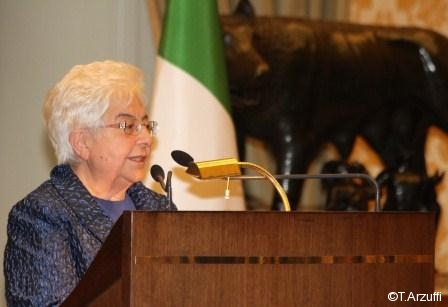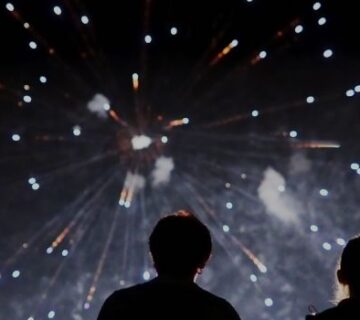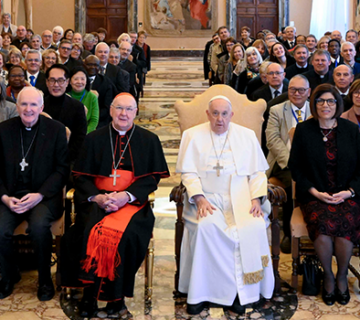Video recordings of the meeting (WebTV Parliament House) – Italian only
 The meeting on 14f June 1011, in memory of Igino Giordani (1884-1980), was sponsored by the President of the House. Giordani was remembered as a multi-faceted personality of the twentieth century, deputy of the Italian Parliament from 1946 to 1953, writer, journalist, ecumenist and patrologist. Igino Giordani left a deep imprint and opened prophetic perspectives at cultural, political, ecclesial, and social levels. President of the Chamber, Gianfranco Fini, presided over the proceedings. Among the presentations, Alberto Lo Presti, Director of the Igino Giordani Centre presented Giordani the politician and his actions in Parliament. Parliamentarians, young people, Italians and people from other lands spoke of how they have been influenced by Giordani’s thought and actions. Below is the full text of the speech presented by Maria Voce.
The meeting on 14f June 1011, in memory of Igino Giordani (1884-1980), was sponsored by the President of the House. Giordani was remembered as a multi-faceted personality of the twentieth century, deputy of the Italian Parliament from 1946 to 1953, writer, journalist, ecumenist and patrologist. Igino Giordani left a deep imprint and opened prophetic perspectives at cultural, political, ecclesial, and social levels. President of the Chamber, Gianfranco Fini, presided over the proceedings. Among the presentations, Alberto Lo Presti, Director of the Igino Giordani Centre presented Giordani the politician and his actions in Parliament. Parliamentarians, young people, Italians and people from other lands spoke of how they have been influenced by Giordani’s thought and actions. Below is the full text of the speech presented by Maria Voce.
“I thank the Honourable President of the Chamber of Deputies, Gianfranco Fini, for having given me the opportunity of addressing a greeting to this gathering in honour of Igino Giordani, who is one of the founding fathers of the Republic and whom we consider one of the co-founders of the Focolare Movement which I represent before you today.
I extend personal greetings to the Honourable Senators and Deputies, to all the authorities, and to everyone present here today.
It was on 17 September of 1948 when, right here in the Chamber of Deputies, Igino Giordani met Chiara Lubich for the first time. She was a young woman of twenty-eight years, visiting from Trent, and accompanied by a group of consecrated religious.
For Giordani the meeting was as extraordinary as it was surprising. From that moment he was no longer the same. What did Chiara Lubich say, what words did she use to get so deep into the soul of the eclectic politician of those times. Something of it we know. In fact, at the end of their conversation, the Hon. Giordani, very impressed by what he had heard, invited Chiara to write down what she said so that it could be published in a magazine that he directed. The following month the article was published, which begins with the story of how the ideal of unity was born beneath falling bombs:
‘It was wartime. Everything was crumbling before the eyes of us young women, who were attached to our future dreams: a house, an education, loved ones, a career. […] From the complete destruction of that war, our Ideal was born. It seemed that there was only one true ideal that was true and everlasting: God.
Surrounded by the destruction caused by so much hate, God suddenly appeared to our minds as the one who doesn’t die.
And we saw and loved him in his true essence: God is love.’
‘It was wartime. . . ‘. Igino Giordani could claim to be a true expert on the subject. He had firsthand experience, in the trenches of World War I. He saw the atrocities, the massacres, and he was also seriously wounded. He was convinced of the absurdity of armed conflict and he gained a name for himself in Italian culture as a defender of peace.
But Chiara’s words did not have the horror of the war as their theme. Chiara spoke of how, years before, in the bombed-out city of Trent, in the midst of ruin, she caught sight of an indestructible ideal: God. He revealed himself to her eyes not as a last hope, a remote desire, but as love flowing among all things, a fire to be guarded and preserved and increased by mutual love, a love capable of bringing about the promise of Jesus: “For where two or more are gathered together in my name, there am I in the midst of them” (Mt. 18:20).
It is not difficult to understand why the Hon. Giordani was so awestruck. A living Gospel was revealing itself to him before his very eyes. The Jesus whom Chiara was showing to him, was entering into human history as love, and was guiding the human family toward universal brotherhood, toward unity. Recalling that encounter in his autobiography, Giordani reveals what his sentiments:
When she finished talking, I was caught in an enchanting atmosphere […]; and I would have desired that voice to continue speaking. It was the voice that, without realizing it, I had always been waiting to hear.
It placed holiness within the reach of everyone: it took away the grates that separated the world of the laity from the mystical life. […]
It drew God near: it made you feel him as Father, Brother, Friend, closely present to the human family.
It was clear to Chiara and her first companions that an ideal as vast as unity would have to embrace the whole world. But how could a small group of such young women ever reach all of humankind? Perhaps Giordani asked himself the same question! Today we know for sure, because Chiara herself said that this first encounter with Igino Giordani was a first like a first contact with humanity at large.
Chiara Lubich’s ideal of unity was for everyone and every human reality, and Giordani gives witness to this.
Now the plot of that plan is more visible. The Focolare Movement is present in over 180 countries worldwide, and has more than two million members and supporters from the most diverse social and cultural backgrounds.
I have just returned from a visit to Eastern Europe where the Focolare community has been present since 1961 when the first group of members, armed only with mutual love and love for all, crossed the iron curtain.
Their silent work for so many years, has led to the overcoming of ideological barriers, and supported the effort to rebuild that oppressed society. Today it brings a soul to many social projects for the common good.
Last May in Brazil, a world Assembly of the Economy of Communion was held twenty years after that prophetic intuition that Chiara had when, arriving in San Paolo in 1991, flying over the city, she saw the skyscrapers and the ‘crown of thorns’ of the favelas that surrounded the walthy metropolis. She felt the urge to do something to change the system of development, to search for a new way that was neither capitalism nor communism.
The many projects that the Focolare Movement finds itself committed to in all corners of the world and in all fields of human activity were in a sense prophetically present in that first encounter between Chiara Lubich and Igino Giordani when they met here at Montecitorio. Since then the Movement has also placed itself at the service of politics. In those years, it attracted many deputies and senators – some of which have been mentioned in the previous video – and the choices they made were courageous.
Today this is still the proposal of the Political Movement for Unity, founded by Chiara Lubich in 1996, together with some politicians and members at various institutional levels – Korea, Argentina and in other nations – of local administrators, officials, political scholars, and many young people involved through the involvement of schools.
It is animated by a love that guides political choices, actions, laws, diplomatic moves; offering a glimpse of a new way of doing things for administrative, legislative and international bodies.
It is inspired by the principle of fraternity, a cardinal principle of modern political thought. As we know, it was the basis of some of the most important political projects in modern and contemporary history: from the French Revolution (think of the triptych liberté egalité fraternité) to the founding of Utopian socialism, from Marxism to Patriotic nationalism. However, it was interpreted not in an inclusive sense, but in an exclusive one. Fraternity was considered to be a relationship of value which regarded someone (a social class, an economic class, a people) in an antagonistic relationship with someone else.
Thus, it is a political principle still little explored in its universal dimensions, and this is what the Political Movement for Unity intends to do: to explore the principle of universal brotherhood so that politics may find in it a new basis that will raise it to the level of the modern times, capable of fulfilling its role as a builder of peace, justice, and freedom, for the entire human community. Fraternity also sheds light on the ultimate goal of politics, which is establishing peace that leads to the unity of the whole human family: unity in the smallest political community as in the entire international forum. Thus, the principle of fraternity finds its measure in “loving the homeland of others as one’s own”, an expression coined by Chiara Lubich that from the earliest times has signified universality. It is capable of expressing the vocation of politics as love toward all without distinction, because every person and every social entity is a “candidate for unity” with everyone else, and every nation is called to contribute to a more united world.
By recalling today, in this prestigious Seat of the Italian Parliament, some of the lines being taken by the Political Movement for Unity, we once again realize the great actuality of another invitation given to us by Chiara, precisely to the Italian parliamentarians in December 2000 at San Macuto. An invitation which makes a paradox seem possible: to establish a pact between parties – beyond all differences – a pact of brotherhood for Italy, because the good of the country will require the efforts of all.
“Fraternity offers amazing possibilities,” Chiara goes on to tell the MPs. “It allows one to understand and make another’s viewpoint our own, so that no interest, no human need remains foreign to us. […] It allows you to hold together and enhance human experiences that might otherwise develop into intractable conflicts, like the still-open wounds of the Southern Hemisphere and the legitimate demands of the new Northern Hemisphere; […] Moreover, it allows new principles to operate within the daily work of politics, so that no one is ever governed against, and you never act as an expression of only a part of the country.”
That encounter between Chiara Lubich and Igino Giordani led to these and many other things in the fields of society and politics. Giordani, a deputy who on that day at Montecitorio accepted the invitation to widen his soul and his field of action for the unity of our land and beyond. May this meeting today urge us on in strengthening a common desire among all to work for the unity of our land and beyond. Thank you.”
Maria Voce
[nggallery id=52]


 Italiano
Italiano Español
Español Français
Français Português
Português



